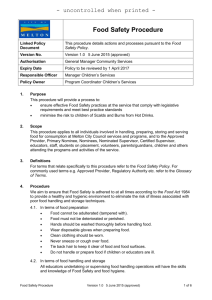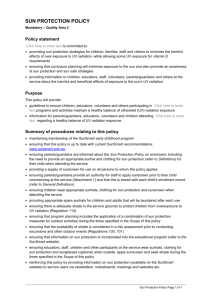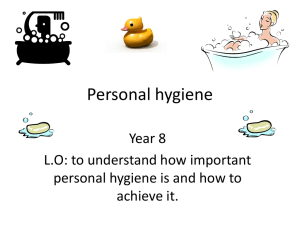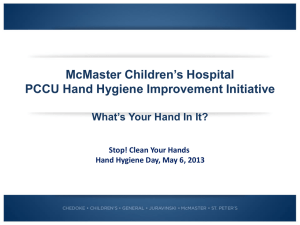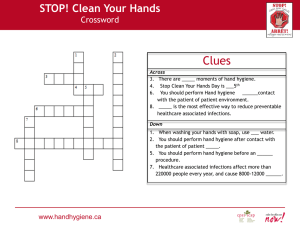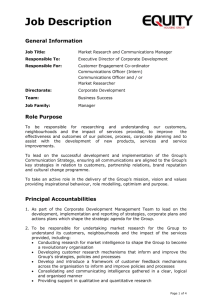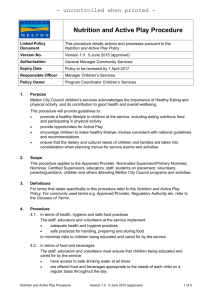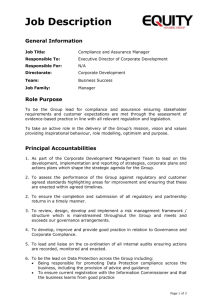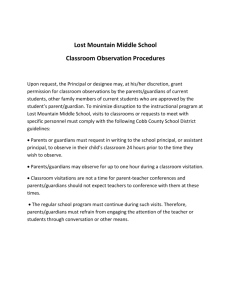Food Safety Policy - Melton City Council
advertisement
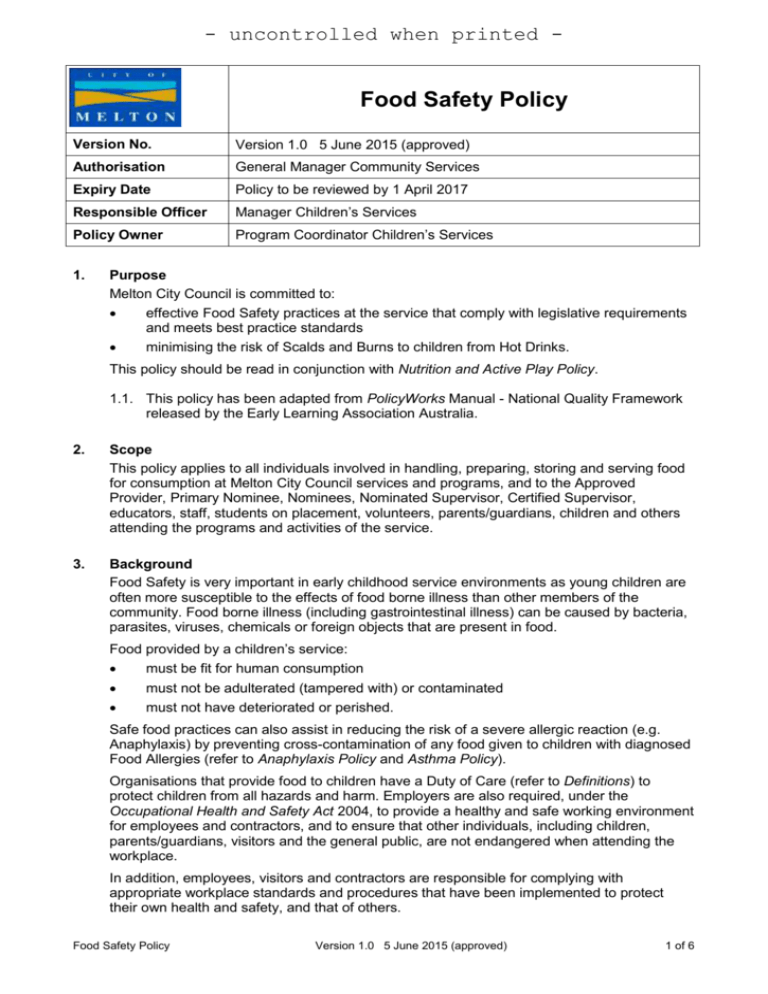
- uncontrolled when printed - Food Safety Policy Version No. Version 1.0 5 June 2015 (approved) Authorisation General Manager Community Services Expiry Date Policy to be reviewed by 1 April 2017 Responsible Officer Manager Children’s Services Policy Owner Program Coordinator Children’s Services 1. Purpose Melton City Council is committed to: effective Food Safety practices at the service that comply with legislative requirements and meets best practice standards minimising the risk of Scalds and Burns to children from Hot Drinks. This policy should be read in conjunction with Nutrition and Active Play Policy. 1.1. This policy has been adapted from PolicyWorks Manual - National Quality Framework released by the Early Learning Association Australia. 2. Scope This policy applies to all individuals involved in handling, preparing, storing and serving food for consumption at Melton City Council services and programs, and to the Approved Provider, Primary Nominee, Nominees, Nominated Supervisor, Certified Supervisor, educators, staff, students on placement, volunteers, parents/guardians, children and others attending the programs and activities of the service. 3. Background Food Safety is very important in early childhood service environments as young children are often more susceptible to the effects of food borne illness than other members of the community. Food borne illness (including gastrointestinal illness) can be caused by bacteria, parasites, viruses, chemicals or foreign objects that are present in food. Food provided by a children’s service: must be fit for human consumption must not be adulterated (tampered with) or contaminated must not have deteriorated or perished. Safe food practices can also assist in reducing the risk of a severe allergic reaction (e.g. Anaphylaxis) by preventing cross-contamination of any food given to children with diagnosed Food Allergies (refer to Anaphylaxis Policy and Asthma Policy). Organisations that provide food to children have a Duty of Care (refer to Definitions) to protect children from all hazards and harm. Employers are also required, under the Occupational Health and Safety Act 2004, to provide a healthy and safe working environment for employees and contractors, and to ensure that other individuals, including children, parents/guardians, visitors and the general public, are not endangered when attending the workplace. In addition, employees, visitors and contractors are responsible for complying with appropriate workplace standards and procedures that have been implemented to protect their own health and safety, and that of others. Food Safety Policy Version 1.0 5 June 2015 (approved) 1 of 6 - uncontrolled when printed The Food Act 1984 aims to reduce the incidence of food borne illness by ensuring that food manufactured, transported, sold, prepared and stored is safe, unadulterated, fit for human consumption and will not cause food poisoning. Under the Food Safety Act, local councils in Victoria are required to classify every food premises in their municipality according to its Food Safety risk. Early childhood services are expected to confirm their Food Safety risk classification and related requirements with the local council in the area in which they operate. Class 1 food premises describe those that predominantly handle potentially Hazardous Food that is served to vulnerable people. Early childhood services that provide Family Day Care (FDC) are exempt in the Class 1 category. Class 4 food premises describe those whose food handling activities pose low risk to public health. Sessional kindergartens and VAC supplying low risk snacks such as cut fruit, milk, bread and cereals are classified as Class 4 (low risk). Class 4 services are not required to have: a Food Safety Program a Food Safety Supervisor an annual council inspection. Class 4 services must ensure that staff/educators have the skills and knowledge needed to safely handle food in their work roles. Council may also, at its discretion, inspect premises under the Food Act 1984 (e.g. to investigate complaints or conduct a spot check). Individual councils may also require services to complete a Food Safety audit or plan, especially when the service is operating a special event such as a sausage sizzle. Further information about Class 4 food premises can be obtained from the Department of Health website (see Sources). 4. Definitions The terms defined in this section relate specifically to this policy and related procedures. For commonly used terms e.g. Approved Provider, Regulatory Authority etc. refer to the Glossary of Terms. Word/Term Definition Burns/Scalds Burns by hot fluids, steam and other hot vapours. Department of Health The State Government department responsible for the health and wellbeing of Victorians, and with oversight of the administration of the Food Act 1984. Duty of Care A common law concept that refers to the responsibilities of organisations to provide people with an adequate level of protection against harm and all reasonable foreseeable risk of injury. Food Allergies Some foods and food ingredients, or their components, can cause severe allergic reactions including Anaphylaxis (refer to Anaphylaxis Policy). Less common symptoms of food allergy include infantile colic, reflux of stomach contents, Eczema and chronic diarrhoea. Food Allergies are often caused by peanuts, tree nuts, milk, eggs, sesame seeds, fish and shellfish, soy and wheat. For further information on Food Allergies see the Allergy & Anaphylaxis Australia Inc website (see Sources). Food Safety (In relation to this policy) ensuring food provided by the service is fit for human consumption. Hazardous Food Food containing dangerous biological, chemical or physical agents, or food in a condition that has the potential to cause adverse health effects in humans. Food Safety Policy Version 1.0 5 June 2015 (approved) 2 of 6 - uncontrolled when printed Word/Term Definition Hot Drink Any container holding a liquid that has been heated or boiled, and that remains above room temperature (25°C) for any period of time. 5. Policy Melton City Council is committed to: ensuring the safety of all children and adults attending the service taking all reasonable precautions to reduce potential hazards and harm to children attending the service ensuring adequate health and hygiene procedures are implemented at the service, including safe practices for handling, preparing, storing and serving food promoting safe practices in relation to the handling of Hot Drinks at the service educating all service users in the prevention of Scalds and Burns that can result from handling Hot Drinks complying with all relevant legislation and standards, including the Food Act 1984 and the Australia New Zealand Food Standards Code. 6. Responsibility/Accountability 6.1. The Approved Provider, according to Regulations is responsible for the implementation of this policy. This will be achieved through the Leadership Group and their service staff: ensuring that the Nominated Supervisor, Primary Nominee, staff/educators and volunteers at the service implement adequate health and hygiene practices, and safe practices for handling, preparing and storing food, to minimise risks to children being educated and cared for by the service (National Regulations 77) contacting the Council’s Health department to determine the service’s Food Safety risk classification and requirements under the Food Act 1984 complying with all requirements of the service’s Food Safety risk classification under the Food Act 1984, as outlined by Council (refer to Background and the Department of Health website – see Sources) providing parents/guardians with access to this policy, and with up-to-date information on the safe provision of food for their children (refer to Food Safety at Home and in the Community on the Department of Health website – see Sources) ensuring that the Nominated Supervisor, Primary Nominee and all staff/educators are provided with access to this policy and are kept up-to-date with current legislation, standards, policies, information and resources relating to Food Safety ensuring that staff/educators undergo training in safe food handling, as required monitoring staff/educators compliance with Food Safety practices (refer to Food Safety: Keeping Food Safe on the Department of Health website – see Sources) encouraging volunteers to complete training in safe food handling techniques (refer to Department of Health website – see Sources) ensuring that good hygiene practices are maintained at the service (refer to the Hygiene Policy and Food Safety: Keeping Food Safe on the Department of Health website – see Sources) displaying hygiene guidelines/posters and Food Safety guidelines/posters in the food areas of the service for the reference of staff/educators and families involved in the preparation and distribution of food to (refer to the Hygiene Policy and Food Safety: Keeping Food Safe on the Department of Health website – see Sources) Food Safety Policy Version 1.0 5 June 2015 (approved) 3 of 6 - uncontrolled when printed ensuring that this policy is referred to when undertaking risk assessments for excursions and other service events ensuring measures are in place to prevent cross-contamination of any food given to children with diagnosed Food Allergies (refer to Anaphylaxis Policy and Asthma Policy) identifying potential hazards that may reasonably be expected to occur at each stage of the food-handling and preparation cycle, and developing procedures to minimise these hazards. Stages of the cycle include ordering, delivery, storage, thawing, preparation, cooking, cooling, handling post-cooking, reheating and serving ensuring that all facilities and equipment for food preparation and storage are clean, in good repair and working order providing a calibrated thermometer in good working order, suitable for monitoring the temperature of the fridge/freezer in food preparation areas. Glass thermometers containing mercury are not recommended in or near food preparation areas removing pests and vermin from the premises informing the Department of Education & Training (DET), Department of Health and parents/guardians if an outbreak of gastroenteritis or possible food poisoning occurs at the service informing families of the availability of cold storage facilities at the service to ensure parents/guardians make suitable food choices when supplying food for their own child ensuring staff/educators, parents/guardians and others attending the service are aware of the acceptable and responsible practices for the consumption of Hot Drinks (refer to Attachment 1). 6.2. Certified Supervisors, Nominees educators and other staff are responsible for: keeping up-to-date with current legislation, standards, policy, information and resources relating to Food Safety being aware of safe food practices and good hygiene practices and undergoing training if required (refer to the Hygiene Policy and Food Safety: Keeping Food Safe on the Department of Health website – see Sources) referring to this policy when undertaking risk assessments for excursions and other service events informing students, volunteers, casual and relief staff at the service about this policy ensuring that children’s lunchboxes are kept indoors, away from heat sources (including direct sunlight) and refrigerated if necessary discussing Food Safety with children to increase awareness and assist in developing safe practices ensuring children do not share drink bottles or cups at the service ensuring that children do not share foods to minimise risks in relation to children with Food Allergies providing adequate supervision of children while they are eating (refer to Supervision of Children Policy) teaching children to wash and dry their hands (refer to Hygiene Policy): before touching or eating food after touching raw chicken or raw meat after using the toilet after blowing their nose, coughing or sneezing Food Safety Policy Version 1.0 5 June 2015 (approved) 4 of 6 - uncontrolled when printed after playing with an animal/pet encouraging parents/guardians to discuss a child’s nutritional requirements, Food Allergies or food sensitivities, and informing the Nominated Supervisor where necessary seeking input from parents/guardians on cultural values or religious expectations regarding food handling, provision and consumption informing the Nominated Supervisor and Primary Nominee of any outbreaks of gastroenteritis or possible food poisoning at the service removing Hazardous Food (refer to Definitions), including food that has fallen on the floor, and providing alternative food items maintaining good personal and kitchen hygiene (refer to the Hygiene Policy and Food Safety: Keeping Food Safe on the Department of Health website – see Sources) covering all wounds/cuts on hands or arms with wound strips or bandages washing hands prior to participating in food preparation and cooking activities or wearing disposable gloves when handling food complying with the guidelines in relation to the consumption of Hot Drinks at the service (refer to Attachment 1) informing parents/guardians and visitors to the service about the guidelines in relation to the consumption of Hot Drinks at the service (refer to Attachment 1). 6.3. Parents/guardians are responsible for: washing hands prior to participating in food preparation and cooking activities or wearing disposable gloves when handling food ensuring that food preparation surfaces, utensils, lunchboxes and reusable drink bottles are clean washing all fruits and vegetables thoroughly packing a cold item, such as a frozen water bottle, with perishable foods in a child’s lunchbox, or using an insulated lunchbox or cooler complying with the requirements of this policy providing details of specific nutritional requirements (including Food Allergies) on their child’s enrolment form, and discussing these with the Nominated Supervisor, Primary Nominee and/or any other relevant staff/educators prior to the child commencing at the service and whenever these requirements change. 6.4. Volunteers and students, while at the service, are responsible for following this policy and its procedures. 7. References, Sources, Links to Legislation and Other Documents 7.1. Please refer to Reference and Sources page. 7.2. Related service policies: Administration of First Aid Policy Anaphylaxis Policy Asthma Policy Dealing with Medical Conditions Policy Diabetes Policy Excursions and Service Events Policy Hygiene Policy Incident, Injury, Trauma and Illness Policy Food Safety Policy Version 1.0 5 June 2015 (approved) 5 of 6 - uncontrolled when printed 8. Interactions with Children Policy Nutrition and Active Play Policy Occupational Health and Safety Policy Staffing Policy. Attachments - Refer to Food Safety Procedure Attachment 1 - Responsible Consumption of Hot Drinks at the Service Food Safety Policy Version 1.0 5 June 2015 (approved) 6 of 6
